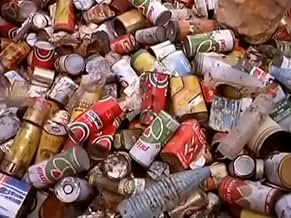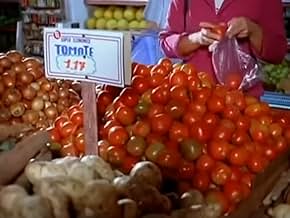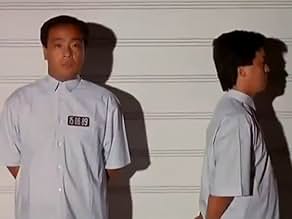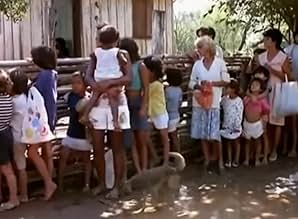IMDb-BEWERTUNG
8,5/10
6910
IHRE BEWERTUNG
Füge eine Handlung in deiner Sprache hinzuA tomato is planted, harvested, transported and sold in a supermarket, but it rots and ends up in the trash. The film follows it to its true end, all to make clear the difference between tom... Alles lesenA tomato is planted, harvested, transported and sold in a supermarket, but it rots and ends up in the trash. The film follows it to its true end, all to make clear the difference between tomatoes, pigs, and human beings.A tomato is planted, harvested, transported and sold in a supermarket, but it rots and ends up in the trash. The film follows it to its true end, all to make clear the difference between tomatoes, pigs, and human beings.
- Regie
- Drehbuch
- Hauptbesetzung
- Auszeichnungen
- 4 wins total
Empfohlene Bewertungen
Not that I've seen a lot, of course. I caught this short in my documentary film class at the beginning of the semester. Unfortunately, I never saw another film better than this one. If you can find it, definitely check it out. The film says more about the human condition in fifteen minutes than most similarly themed films say in two hours. Devilishly humorous, the film hints along the way that there is more at stake than the running joke about a tomato would indicate. It's crucial to know as little as possible, so if you have a good independent video store nearby, seek it out and don't ask questions.
10thbzcrt
That's the kind of movie you'll see quite by chance, one evening on television. And you will never forget it.
"Ilha das flores" is the story of a tomato, from the field where it is cultivated to the dustbin, and beyond. It's fun, and, at the same time, it tells you a lot about the economy and the Brazilian society. What is really unique for a documentary is that the story is as pleasant to follow as in a fiction, and the end is one of the more stunning and moving end I have ever seen in a movie.
"Ilha das flores" is the story of a tomato, from the field where it is cultivated to the dustbin, and beyond. It's fun, and, at the same time, it tells you a lot about the economy and the Brazilian society. What is really unique for a documentary is that the story is as pleasant to follow as in a fiction, and the end is one of the more stunning and moving end I have ever seen in a movie.
The ironic, heartbreaking and acid "saga" of a spoiled tomato: from the plantation of a "Nisei" (Brazilian with Japanese origins); to a supermarket; to a consumer's kitchen to become sauce of a pork meat; to the garbage can since it is spoiled for the consumption; to a garbage truck to be dumped in a garbage dump in "Ilha das Flores"; to the selection of nutriment for pigs by the employees of a pigs breeder; to become food for poor Brazilian people.
Today I have had the chance to see "Ilha das Flores", one of the first works of Jorge Furtado, one of or maybe my favorite Brazilian director in the present days. With a perfect logic, and a pace of video clip, Jorge Furtado exposes the wild Brazilian capitalism, where there are two countries: for those that can afford, and for the millions of miserable that are below a pig in the hierarchy of disputing garbage. This documentary is a devastating and overwhelming social critic to our modern society and may be seen as a funny satire by foreigners, but unfortunately reflects the sad reality of my country. Mandatory masterpiece! My vote is ten.
Title (Brazil): "Ilha das Flores" ("Isle of Flowers")
Today I have had the chance to see "Ilha das Flores", one of the first works of Jorge Furtado, one of or maybe my favorite Brazilian director in the present days. With a perfect logic, and a pace of video clip, Jorge Furtado exposes the wild Brazilian capitalism, where there are two countries: for those that can afford, and for the millions of miserable that are below a pig in the hierarchy of disputing garbage. This documentary is a devastating and overwhelming social critic to our modern society and may be seen as a funny satire by foreigners, but unfortunately reflects the sad reality of my country. Mandatory masterpiece! My vote is ten.
Title (Brazil): "Ilha das Flores" ("Isle of Flowers")
Here's a work that definitely proves how exciting and questioning a short movie picture can be.
Acting as a director, writer and producer, Jorge Furtado couragely aims a dazzling machinegun at issues as assorted as religion, Holocaust, Brazilian government, poverty, capitalism, and how human intelligence has been used throughout the ages.
Using a dialectical method, and narrating the story in a way that "even a Martian would understand", in the words of the author, the film forges a real cinematographical theorem of Brazilian deplorable situation, borrowing as the stage a neighbourhood in the city of Porto Alegre (one of Brazil's most developed ones, by the way). The degrading scenario, however, would apply to any community on the world in which the effects of money (or its lack) on the lives of its inhabitants are more visible.
In the movie's touching final take, Furtado destroys the bourgeois concept of Freedom, quoting a line from one of Brazil's greatest poetesses, Cecilia Meirelles, and leaves us wondering whether modern 'civilisation' is as far as the human intellect can take us.
Acting as a director, writer and producer, Jorge Furtado couragely aims a dazzling machinegun at issues as assorted as religion, Holocaust, Brazilian government, poverty, capitalism, and how human intelligence has been used throughout the ages.
Using a dialectical method, and narrating the story in a way that "even a Martian would understand", in the words of the author, the film forges a real cinematographical theorem of Brazilian deplorable situation, borrowing as the stage a neighbourhood in the city of Porto Alegre (one of Brazil's most developed ones, by the way). The degrading scenario, however, would apply to any community on the world in which the effects of money (or its lack) on the lives of its inhabitants are more visible.
In the movie's touching final take, Furtado destroys the bourgeois concept of Freedom, quoting a line from one of Brazil's greatest poetesses, Cecilia Meirelles, and leaves us wondering whether modern 'civilisation' is as far as the human intellect can take us.
10huineman
Very seldom is one given the opportunity to watch a documentary like Ilha das Flores. It is less a TV product than an essay not written but filmed, and well filmed indeed. The ideas displayed throughout barely quarter an hour are so many and so profound that you might need more than one view to assimilate them all; but the script is so agile that you will never grow bored. Instead, even if you are not in the mood for documentaries at the beginning, will find yourself deeply interested in this humble production within minutes, if not seconds. But remember, you are not dealing with an entertainment product but with one of the best lessons of ethics you might come across ever. Anyway, that you will realize for sure at the end of the film, when its ideas, lingering in your head, will keep you pensive for long.
Wusstest du schon
- WissenswertesThe short opens with three short sentences on screen: "Este filme não é um filme de ficção. Existe um lugar chamado Ilha das Flores. Deus não existe." [This film is not a work of fiction. There is a place named Island of Flowers. God does not exist.]
- VerbindungenFeatures Nazi-Konzentrationslager (1945)
Top-Auswahl
Melde dich zum Bewerten an und greife auf die Watchlist für personalisierte Empfehlungen zu.
Details
- Erscheinungsdatum
- Herkunftsland
- Sprache
- Auch bekannt als
- Isle of Flowers
- Drehorte
- Ilha das Flores, Porto Alegre, Rio Grande do Sul, Brasilien(30º 12' 30" S, 51º 11' 21" W)
- Produktionsfirma
- Weitere beteiligte Unternehmen bei IMDbPro anzeigen
- Laufzeit
- 13 Min.
- Sound-Mix
- Seitenverhältnis
- 1.37 : 1
Zu dieser Seite beitragen
Bearbeitung vorschlagen oder fehlenden Inhalt hinzufügen




















